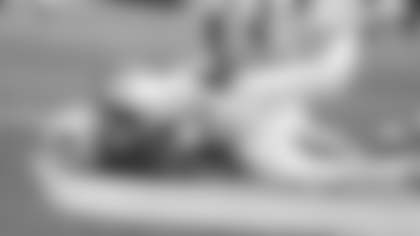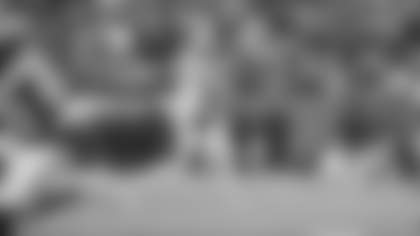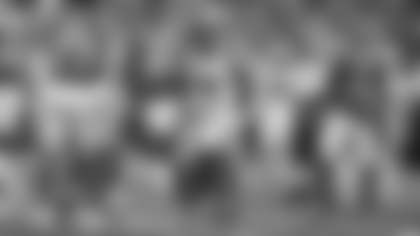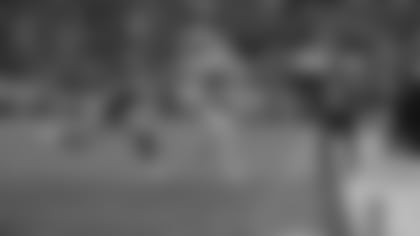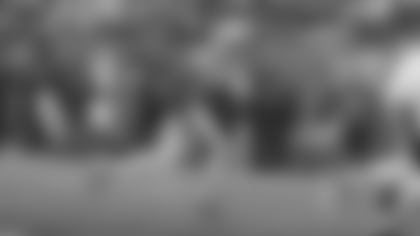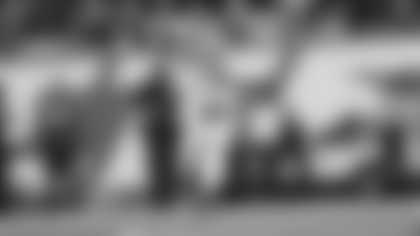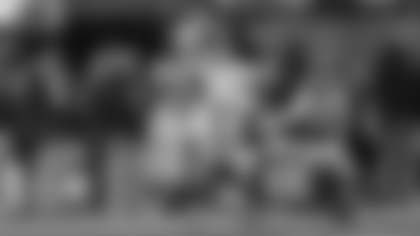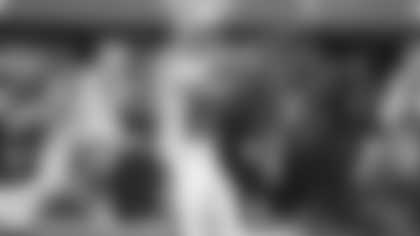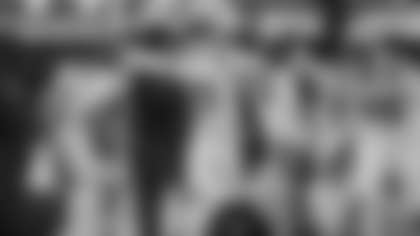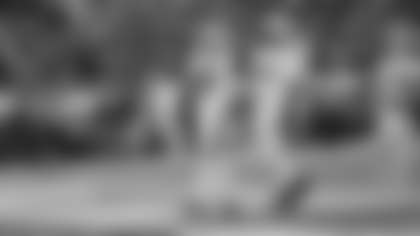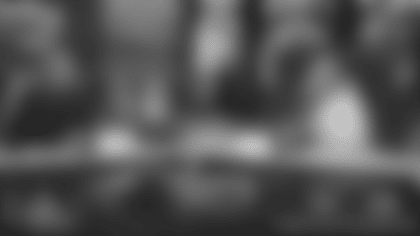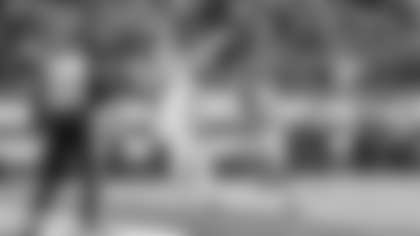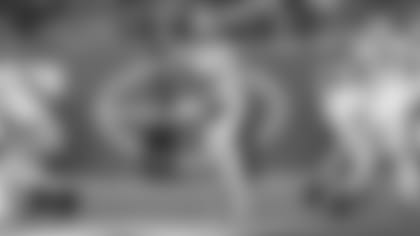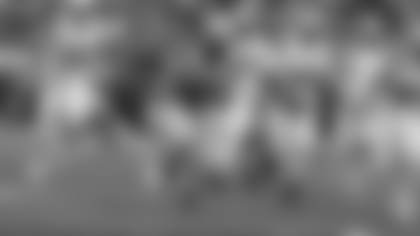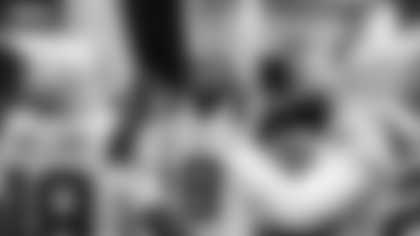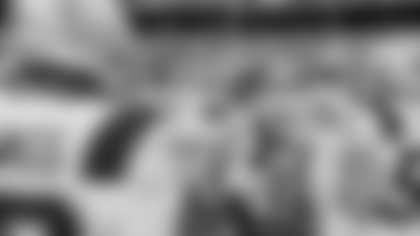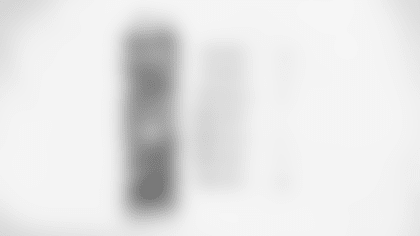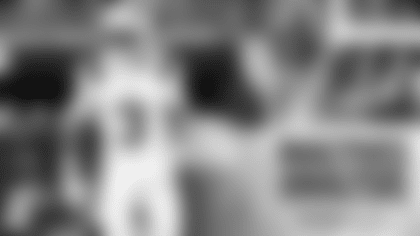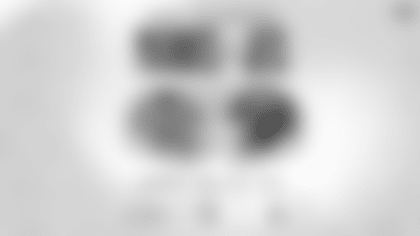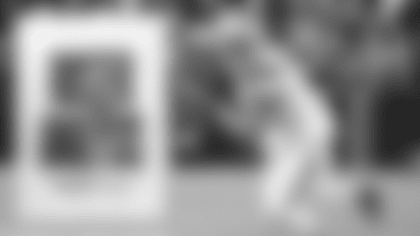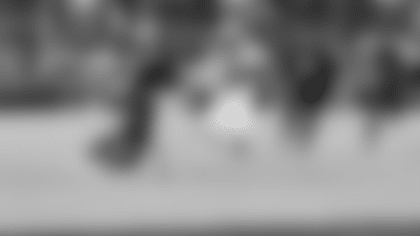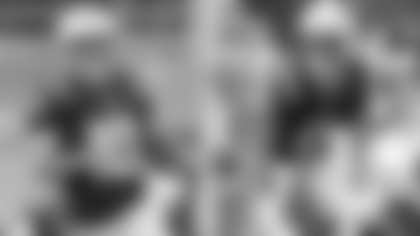NFL OFFICIALS MEDIA BRIEFING UMPIRE BUTCH HANNAH (BH) SIDELINE JUDGE LAIRD HAYES (LH) HEAD LINESMAN PHILIP MCKINNELY (PM)
2008 TRAINING CAMP DAY SIX July 29, 2008
BH: Hello. It is our pleasure to be here. There will be three of us here for the next three days to work the New England Patriots training camp. It is an opportunity for us to get the kinks out of our game, to take some reps and get ready for the season just like the players. It is always something we really look forward to. Two other gentlemen have joined me today. Larid Hayes is a side judge in his 14th year and he is from Newport Beach, California. Phil McKinnely is in his seventh year and he is a head linesman from Atlanta, Georgia. I am Butch Hannah and I work as an umpire. Don't ask me why I am an umpire that is just what I do. This will be my 10th year in the league and I am from Chattanooga, Tennessee. You can tell by my accent that I am not from New England. We think the 2008 rule changes are very simplistic. There are really only a few significant rules that I think an average fan will pick up on during the course of a game. The so-called elimination of the 'force out' rule will impact the game. It also should make our jobs easier to officiate that play. Laird [Hayes] can address any questions you may have about that. Since I am an umpire I don't deal with the sidelines. The rest of the stuff is really just basic. They have eliminated the five-yard facemask penalty. Only the grab and twist or pull will be a foul. It is no longer a foul if you put your hand on an opponent's mask and release. We will see some different things on the coin toss. We will see the college rule where there will be a third choice to defer to the second half for the team that wins the toss. We are not sure how the speaker system thing will work for the defense. It sounds like it will be pretty basic. Our job will be to make sure there is only one designated player with the little green dot on the back of his helmet in the game at a time. That first designated player that comes in does not have to report [to an umpire]. When his backup comes in then he will have to report to the umpire. If the original designated player comes back into play then he will have to report. It's an illegal substitution violation if we have two designated players in at the same time. I don't anticipate that will happen often.
Q: There has been speculation that the league is concerned with players using gang signs during a game. What can you tell us about that?
BH: That will probably be taken care of internally. I am not sure I would know what a gang signal was. I would just be guessing. I believe that will be taken care of internally.
Q: What do you mean by 'handled internally'? Will the league issue fines?
BH: I don't know if I can answer that question. My understanding is that it will be handled internally.
Q: So it wouldn't be a penalty on the field just a fine or some type of punishment after the game?
BH: Yes, that would be my understanding.
Q: What will your role be for the next couple of days? Are you going to be proactive and talk to players or are you going to wait for them to come to you and ask questions?
BH: A little bit of both. Depending on what is going on. If it were group work it would probably be more of a discussion. In my experience, I work with the linemen primarily. Most of our interaction during group work is questions. When we get in teamwork we will be throwing some flags and explaining to them and the coaches what the problem is. We are here to help them and for them to use us anyway that would help them. Our role will change depending on what is going on on the field.
Q: With the defensive player who has a speaker in his helmet, what happens if something goes wrong and they lose communication?
BH: They would lose that avenue of communication. I am sure every team would have a backup plan. In past years, I remember quarterbacks doing this [hitting the helmet] and I assumed there was a communication problem. That player would be on his own from there and would have to go back to using signals.
Q: Would you have a problem with there being different degrees of pass interference penalties similar to what it use to be like for a facemask penalty?
LH: I have never thought about that. The competition committee decides what the rules are going to be and they tell us what they are. It is really that simple. That thought has never crossed my mind and I have never heard it being discussed. This game is tough enough to officiate as it is. My thinking on that as a deep guy is 'Wow, if I have to start thinking about that it could get pretty confusing.'
Q: As a deep guy, do you take into account the stakes of the penalty?
LH: No, absolutely not. You just make the call. We are graded on every single play of every game. Whether it was a correct or incorrect call. They don't grade us on when the foul occurs during the game. It doesn't matter if it's the last play of the game and it [a penalty] puts the ball on the 1-yard line with no time on the clock and they go in and score a touchdown and kick the game-winning extra point. It is either a foul or not a foul.
Q: Is it difficult when it is a possible game ending play, when you are covering the entire end zone?
LH: There are three of us [officials] down there and you have the sideline guys. Phil [McKinnely] and I work side by side. The idea is to have as many sets of eyes on the play as possible. Once the ball goes in the air then you follow the ball. It can get pretty crazy in the end zone when you have guys flying around and that is why you have help. You want at least three officials looking at the play at all times.
LH: Back to your original point of does the stakes of the play change how I call it? No, it doesn't. I have worked several Super Bowls and I treat them like any other game. I worked the Patriots' first two Super Bowl wins against the Rams [2001] and the Panthers [2003]. Those were pretty key games with tough calls right down to the end. You just make the right call.
Q: Do you think college rules are fairer?
LH: I officiated for 13 years in the Pac-10 and like the rules in this league better.
BH: As Laird and coach [Bill Belichick] said earlier, we really just carry out what the competition committee adopts as the rules. All these rules coming up, we have no input on them. It really doesn't matter to them what we think. We just take the rules and make sure they are carried out on the field.
Q: Are there more rule changes this year than the average?
BH: I think it is about the same. I don't think this is an unusual year.
Q: With the defense now being able to use the speaker helmet system, it seems it would be difficult to keep track of with everything going on…
BH: It is, and I will make note of it on my card during the game. Those designated players will have a green dot on their helmet so I am going to have to be more conscious of that. It is a very bright green dot so it should stick out. This will be new for us but it will be good for us to get some reps with it during the preseason. That's administrative and that is how we plan to take care of it. The player has to report to us and we should know that, for example, No. 43 is a backup. It will probably be just certain positions that do it. If you have people on special teams, I don't know how much players will be switching helmets. That is not our responsibility or concern. I think I am going to see people that are generally at one position in the game [that use the speaker helmet].
Q: Has the level of sportsmanship decreased or increased since you first started in the league?
BH: I work as an umpire so I am right in the middle of all that. Football is a collision sport. We could say it is a contact sport but basketball could be considered a contact sport so we call it a collision sport. There is a lot of aggression going on where I am. I don't think it is any different now than it has been in the past.
Q: What is different with how players treat the game now then when you first started?
BH: If you just monitor the game with the demonstrations, physical activity and showmanship - I didn't see as much of that when I first got in the league. That has carried to a level where the league decided it had to do something about it.
Q: What do you think has caused the league to put more of an emphasis on sportsmanship this year?
BH: Generally speaking, I think it was just a few players that created the emphasis on it. That is my reaction to it.
Q: Would you see a logistical problem with all players having the speaker system in their helmet?
BH: It wouldn't affect what I was doing. Would it take away or add something to the game? I don't think I can answer that.
Q: Do you go to other training camps or is this the only one?
BH: We are assigned to one camp. Our preseason starts next week as well so between now and Monday most officials will be visiting the camp they are assigned.
Q: Why are field goal kicks that go right over one of the field goal posts not a reviewable call?
BH: I can only speculate that that is purely a judgment call to some degree. To review it off camera, that would be a tough call to make.
Q: Do you like the elimination of the 'force out' rule for cornerbacks?
PM: Yes, because it make it very simple. You have to catch the ball and have both feet down inbounds. Before you would have to worry about whether he was pushed out of bounds or if he would have landed in bounds. Now it is very simple to rule on.
Q: Will it be easier for you guys with the elimination of the incidental facemask penalty?
BH: I think it will make it easier for us. I heard that there were so few 5-yard penalties in the last few years that it wasn't needed. Sometimes you see it on there [replay] but you can't get a good look. Now there definitely has to be a pull or a twist for it to be a penalty.
Q: What about when an offensive player shoves the defensive player in the facemask?
BH: Well the rule says you can't punch a defender in the face. That is a hard act to define many times. It is a hard one to see. From my perspective a lot of times I see the hit and the defender's head go back but I realized later that he was pushed in the chest and then his head went back. It is a hard distinction to make. It is only when I see an obvious punch to the face but that is not something we see much of.
Q: A few years ago they tested the idea of officials standing behind the offense in NFL Europe. Where does that possibility stand now?
BH: That stands in the garbage can I think. We tried it in two of our preseason weeks last year. It had its pluses but had its minuses as well. Evidently from what I gathered the competition committee thought there wasn't enough pluses for them to make that change. They were worried you were giving up too much interior.
Q: From your personal experience, what did you think the positives and negatives from being behind the offense?
BH: My wife was thoroughly excited for it because she thought it would add another five years to my career. There were certain good aspects like being able to see offensive holding better. However, you could not see defensive holding at all. You had no interaction with the defense. You couldn't see the passes over the middle. Generally speaking, ball mechanics were a little bit of an issue. There weren't enough plusses for it to change. It has moved to the back shelf. That was the second time we experimented with it.


